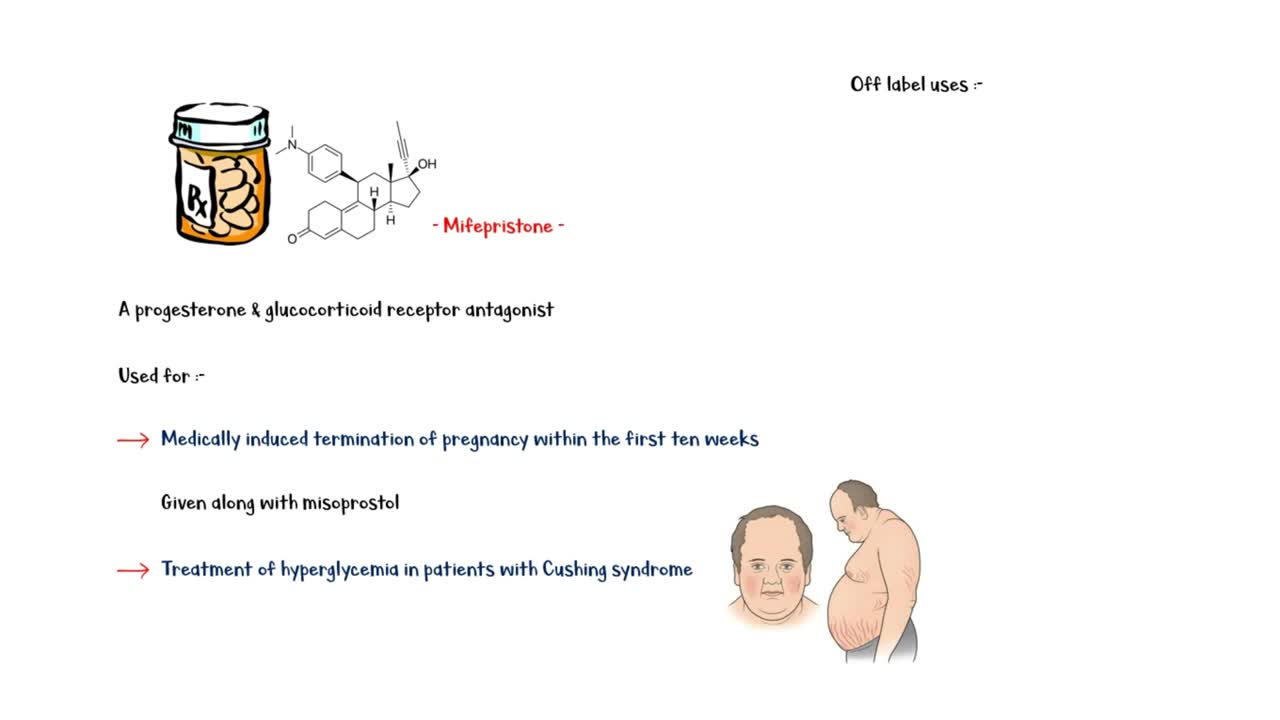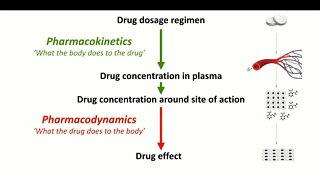Premium Only Content

Mifepristone (Medically Induced Abortion Drug) _ Uses, Mechanism Of Action, Dose, Adverse Effects
Mifepristone, is a progesterone and glucocorticoid receptor antagonist, given along with misoprostol, for medically induced termination of pregnancy within the first 10 weeks of gestation. In addition, it is also indicated for the treatment of hyperglycemia in patients with Cushing syndrome. Off label uses of mifepristone include, post coital emergency contraception. Induction of cervical maturation. And as an adjunct therapy for uterine fibroids.
Progesterone is one of the 2 major sex hormones in females, and it plays a major role in early pregnancy. It is secreted in large amounts by the corpus luteum of the ovary during the early weeks of gestation. It is responsible for preparing and maintaining the uterine endometrium for implantation. In addition, it suppresses the maternal immunologic response against fetal antigens, which prevents maternal rejection of the embryo. It also inhibits prostaglandin synthesis in the body. Prostaglandin promotes contraction of uterine smooth muscles, which may lead to expulsion of the fetus during early pregnancy. Finally, progesterone is also important in the development of maternal breast tissue.
Antagonism of progesterone receptors by mifepristone leads to decreased action of progesterone on the uterine endometrium, and leads to unopposed prostaglandin synthesis. Decreased progesterone action leads to necrosis and shedding of the decidual endometrium, which makes it unfavorable for the implantation. Unopposed prostaglandin synthesis leads to increased contractions of the uterine smooth muscle cells, which also makes the implantation difficult.
Mifepristone is taken per orally. It is available as 200 and 300mg tablets. For pregnancy termination, a 200mg single dose is recommended. For the treatment of hyperglycemia in Cushing syndrome, the initial dose should be 300mg once daily with meals, and the dose can be increased subsequently up to 1200mg per day. For emergency contraception, a 600mg single dose is recommended within 72 hours of unprotected sexual intercourse.
Serious adverse effects of mifepristone include, anaphylaxis. Toxic epidermal necrolysis. And angioedema. Moderate adverse effects include, hypokalemia. Peripheral edema. Hypertension. Hypoglycemia. Constipation. And vaginal bleeding. Mild side effects include, nausea and vomiting. Abdominal pain. Fatigue. Headache. Dizziness. And menstrual irregularities.
#mifepristone #misoprostol #medtoday
medical abortion,abortion pill,medication abortion,mifepristone,mifepristone and misoprostol,misoprostol abortion,abortion pill dose
-
 9:14
9:14
Medic Fuel
2 years agoPharmacodynamics Mechanism of Drug Action
39 -
 5:53
5:53
Newsy
2 years agoThe Medical Effects of Abortion Bans
76817 -
 1:05:35
1:05:35
Man in America
9 hours agoFort Knox & Trump’s Secret Gold Move—The Financial Reset NO ONE Is Ready For?
32.3K19 -
 2:21:20
2:21:20
Robert Gouveia
6 hours agoTrump Goes to SCOTUS! Judge CAVES on DOGE? Fani Willis Not Happy!
72K18 -
 20:41
20:41
Stephen Gardner
6 hours ago🔥You Won't BELIEVE What JUST Happened To Don Trump Jr.!!
66.8K121 -
 58:00
58:00
The StoneZONE with Roger Stone
4 hours agoEuropean Leaders Resist Trump Peace Overtures To Their Own Demise | The StoneZONE w/ Roger Stone
48.4K11 -
 9:29
9:29
AlaskanBallistics
6 hours ago $1.77 earnedWyoming Suppressors and Rifles at Shot Show 2025
40K2 -
 1:06:40
1:06:40
Donald Trump Jr.
10 hours agoThe Left is Taking one L After Another, Live with Michael Knowles | Triggered Ep. 217
139K103 -
 47:17
47:17
Kimberly Guilfoyle
10 hours agoWoke Gets DOGE’d, Live with AJ Rice & Jarrett Stepman | Ep. 197
105K41 -
 20:11
20:11
Candace Show Podcast
8 hours agoBecoming Brigitte: Candace Owens x Xavier Poussard | Ep 6
157K306